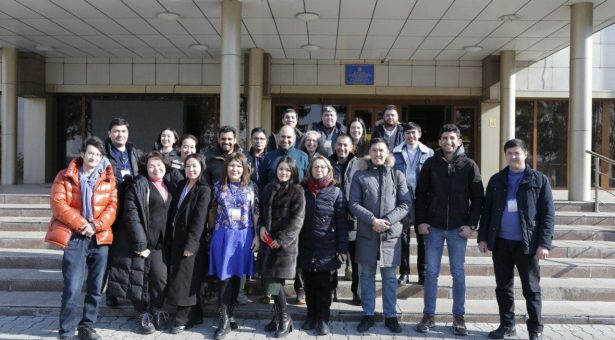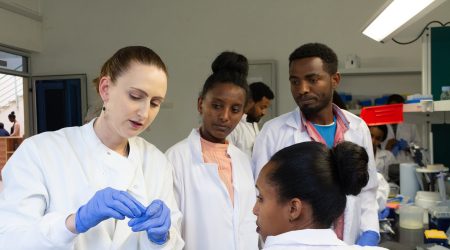Wheat genetics and genomics workshop in Kazakhstan

On the 28th of January, Professor Cristobal Uauy, Dr Luzie Wingen and Anna Backhaus from the John Innes Centre (JIC) set out for Kazakhstan to deliver for a one-week workshop on wheat genetics and genomics.
Almost a year in the making, the idea for the workshop began in the JIC Crop Genetics ground floor coffee room where the inequalities in access to genetic and genomic tools across the globe were a reoccurring topic discussed by Anna and former JIC colleague Kanat Yermekbayev.
“Kanat and I thought it would be great to actively address this issue,” said Anna, a PhD student in the Uauy group. “Many of the tools that we use at JIC are freely available, however, we realised that we only learned about them here, where the communal knowledge of research tools is vast.
“Of course, some tools and techniques rely heavily upon the availability of equipment, chemicals, and reagents – things that cannot be easily transferred to other institutes. Even the acquisition of reagents can be difficult in other countries, where the distributing companies are not operational or supply chains are lacking.
“However we do have a comprehensive suite of online tools available to crop scientists, that are free, easily accessible online and require minimal programming skills. You can find out more about them on the website, www.wheat-training.com.”
Kanat returned to Kazakhstan in 2022, starting his own research group at Zhetysu University, opening up the opportunity to hold a workshop in Central Asia to disseminate these tools.
Anna continues “Hosting training events outside the UK is really important as travelling from other countries can be difficult. Financial and visa-related complications can limit the accessibility and availability of training available at the John Innes Centre, and as one participant commented, ‘As we cannot go to JIC, we invite JIC to come to us’.”
The workshop was made possible because of the support provided by Cristobal, Luzie and Dr Simon Griffiths, as well as funding from the John Innes Centre, Zhetysu University, CIMMYT and the BGRI Women in Triticum program.
“Upon landing in Almaty in Kaszakhstan, we were excited to be reunited with our colleagues, and to explore this new country,” continues Anna. “It was a 3-hour drive from Almaty to Taldykorgan where the workshop was to be held, passing through snowy plains with herds of livestock wandering past frozen lakes and mountains. Stopping for lunch, we immediately explored the local wheat diversity in the form of fried doughballs, samsa (local dumplings), cheese filled flatbreads that are just like Chilean empanadas, and fresh bread.”
Wheat is one of the major staple crops in Kazakhstan and furthermore a very important export commodity, mainly to surrounding Central Asian countries such as Afghanistan, Kyrgyzstan and Uzbekistan. It is cultivated on over 10 million hectares of land but has an extremely short growing season, from April/May until September. This is due to the cold winters (-20 C or lower) and hot summers which don’t allow for much crop growth. In comparison, UK weather “extremes” are more tame.
“We learned from Kanat that snow plays an important role for agriculture in Kazakhstan. Once the snow melts, the crop is planted in the wet soil and sometimes there is no more rain or irrigation afterwards. Thus, the predicted effects of climate change and the predicted loss of snow and glaciers in the region would have devastating effects on crop yields.”
The next morning, the team arrived at Zhetysu University and met the 21 course participants, who came from five different countries (Kazakhstan, Uzbekistan, Kyrgyzstan, Turkey and Pakistan) and work or study in universities, national breeding programs or in CIMMYT programs. The participants were split equally between female and male participants was excellent, as female representation in science is high in Kazakhstan.
After a brief introduction by the host university, the workshop team dived into the thick of wheat genetics. Luzie lead the participants through the process of finding new genes linked to phenotypes (known as GWAS).
Inspiringly, Luzie was able to convey the teachings of this complex topic in only one day and by the end of it, one could see Manhattan plots popping up on screens all around the room. The practical sessions formed a vital part of the course as they ensured that everyone could perform the analysis and use the tools once they were back at their home institution.
On the second day of the workshop, Cristobal started the session with a whistle-stop tour of the latest genomic tools, going from genes to scaffolds, to pangenomes. Participants revised the alphabet of wheat genetics and learned about the complex nomenclature of genes. In the afternoon session, we discussed the fine mapping of genes, which led to some great chromosome art.
After all the theory, day three and four consisted of the hands-on design of Kompetitive allele specific PCR (KASP) markers, followed by a laboratory practical on KASP.
Anna explains, “The hands-on sessions are really important; seeing the theory in practice is a vital training step. To our surprise, we were filmed by a national TV station for the news that evening. We hope this will have helped raise awareness of the workshop and the importance of crop research in the region.”
“When we developed the workshop, the idea was to not only to deliver technical training but also facilitate the development of a stronger network between the participants. The diverse background of institutes, countries and career stages of participating scientists became a major strength, a lot of capacity, knowledge and technical support already exists within the region.
“A highlight for me was when all participants gave a short presentation about themselves and their work, it gave everyone the chance to get to know each other better and find out about the exciting projects each participant was working on.
“The networks and connections formed during the workshop will be a great foundation for new projects, will strengthen future funding applications, and should lead to further knowledge exchange within the region.”
The final day of the workshop included a networking session, where participants actively talked about the need to connect with each other and define some common goals and demands. The resulting summary document is a helpful guide for funding agencies and universities to understand the common needs and goals of the regional scientists.
“One important message from the workshop was that the collaboration and communication between the institutes in this region and internationally must be strengthened in the future, for example through improved exchange programs,” emphasised Anna. “After all, the workshop was only created because Kanat, and before that his supervisor gained scholarships (in 1999) that allowed them to study abroad and establish these links.”
“This workshop has been an outstanding example of what can happen in an institute that encourages collaborations, independence and diversity in early career researchers. The vibrant and interactive community at JIC has led to many great projects and I am sure a few of them have started in the same coffee room.”
The workshop was delivered Cristobal Uauy, Luzie Wingen, Anna Backhaus and Kanat Yermekbayev, and funded by the John Innes Centre, Zhetysu University, CIMMYT and the BGRI Women in Triticum program.
The participants were: Aigul Amangeldieva, Kazakh Research Institute of Agriculture and Plant Growing; Aizhan Zhusupova, Al-Farabi Kazakh National University; Akerke Amalova, Institute of Plant Biology and Biotechnology; Daniyar Tajibayev, Kazakh National Agrarian University; Dilnur Tussipkan, National Center for Biotechnology; Gulnur Suleimanova, Kazakh National Agrarian University; Rakhimbek Bektayev, Nazarbayev University National Laboratory Astana; Ulbike Amanbayeva, Zhetysu University named after I.Zhansugurov; Zagipa Sapakhova, Institute of Plant Biology and Biotechnology; Zhuldyz Sartbayeva, Zhetysu University named after I.Zhansugurov; Bakytbek Imanaliev, Kyrgyz Research Institute of Agriculture; Abdul Aziz, CIMMYT/Pakistan; Zaheer Abbas, National Agricultural Research Centre; Emrah Koc, CIMMYT/Turkiye; Fatma Betul Sade, Central Research Institute for Field Crops; Hatice Geren, Aegean Agricultural Research Institute; Ugur Sesiz, Cukurova University/Sirnak University; Abdurauf Dolimov, Institute of Genetics and Plant Experimental Biology; Bakhtiyor Rakhmanov, The Center of Genomics and Bioinformatics; Doston Erjigitov, Institute of Genetics and Plant Experimental Biology; Ozod Turaev, Uzbekistan.



